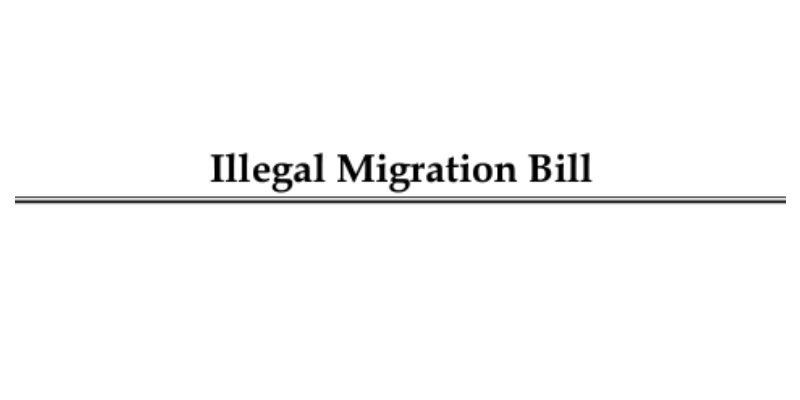The Government’s Illegal Migration Bill: A biblical response
Why the church cannot afford to be silent and sit on the fence. By Israel Olofinjana

Introduction
Recently the UK government announced a new proposed bill - the Illegal Migration Bill - which states in the introduction to the 66 page document that, “The purpose of this Act is to prevent and deter unlawful migration, and in particular migration by unsafe and illegal routes, by requiring the removal from the United Kingdom of certain persons who enter or arrive in the United Kingdom in breach of immigration control.” (Illegal Migration Bill, 2023).
Aside from the fact that the proposed bill does not align with the 1951 Refugee Convention, Home Secretary Suella Braverman has also explicitly stated that it is not in line with UN human Rights conventions: “I am unable to make a statement that, in my view, the provisions of the Illegal Migration Bill are compatible with the Convention rights, but the Government nevertheless wishes the House to proceed with the Bill."
Reading through the 66 page document, what also became very clear to me was the lack of humanity in the proposed policy. When does it become illegal to be fleeing because of persecution, political situation, war, conflict, climate crisis and seeking better life?
Biblical reflections
One of the significant things we learn in the Old Testament is how God ensured that there is provisions for people who are on the margins of society such as the fatherless, widows and the strangers.
“Do not deprive the foreigner or the fatherless of justice, or take the cloak of the widow as a pledge. Remember that you were slaves in Egypt and the Lord your God redeemed you from there. That is why I command you to do this.
“When you are harvesting in your field and you overlook a sheaf, do not go back to get it. Leave it for the foreigner, the fatherless and the widow, so that the Lord your God may bless you in all the work of your hands… Remember that you were slaves in Egypt. That is why I command you to do this.” (Deuteronomy 24:17–19, 22)
This scripture is of significance because it not only states why the Israelite community have to care for foreigners and strangers seeking refuge, but adds in detail how to care by making provisions available for migrants. It was in following this pattern of hospitality that Ruth, a foreigner that would not normally be welcomed by the Israelite, was welcomed into the community of Israel by Naomi and Boaz (Ruth 1:15–16: 2:1–7).
But perhaps, the most important migrant story in Scripture is that of Jesus whose parents had to flee to Egypt in order to protect him from the government of the day in Herod the King. Jesus' birth upset the Royal establishment and was viewed as a threat to national security; his parents therefore had to flee to Egypt as refugees to protect his life. This means that Jesus himself experienced forced migration.
When they had gone, an angel of the Lord appeared to Joseph in a dream. “Get up,” he said, “take the child and his mother and escape to Egypt. Stay there until I tell you, for Herod is going to search for the child to kill him.”
So he got up, took the child and his mother during the night and left for Egypt, where he stayed until the death of Herod. And so was fulfilled what the Lord had said through the prophet: “Out of Egypt I called my son" (Matthew 2:13-15).
If Jesus was seeking asylum in Britain today, with the current proposed bill his family would probably be denied, sadly.
A final biblical response is that New Testament writers also appear to describe Christians as having heavenly citizenship. That is, an identity that can be described as trans-national in the sense of belonging to something much bigger than a nation-state identity.
Paul says, “But our citizenship is in heaven. And we eagerly await a Saviour from there, the Lord Jesus Christ" (Philippians 3:20 NIV).
The implication is that all Christians irrespective of our national identity are temporary residents, migrants, strangers. Peter describes Christians as ‘strangers in this world’ in 1 Peter 1:1. The NKJV in the same verse describes us as ‘sojourners’, Good News as ‘refugees’, NRSV as ‘exiles’, New Living Translation (NLT) as ‘foreigners’.
In the light of this what should be our response as the church?
Our response
We need to be courageous and prophetic and speak truth to power by calling out the Government on this bill. Moses confronted Pharaoh; it is time for the church to challenge the Government on this bill. This will mean for some engaging with the processing of the bill. For others, it will mean campaigning, lobbying, writing to your MPs and most importantly helping refugees and people seeking asylum.
One thing that is clear is that the church cannot afford to be silent and sit on the fence.
The Revd Dr Israel Oluwole Olofinjana is an ordained and accredited Baptist minister and has led two multi-ethnic Baptist churches and an independent charismatic church. He is the director of the Evangelical Alliance's One People Commission
Do you have a view? Share your thoughts via our letters' page.
Baptist Times, 03/04/2023